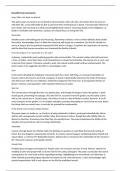Rossetti Poem Summaries
Song: When I am dead, my dearest
This poem urges a loved one to not dwell on bereavement: when she dies, she wishes them to move on
with their life, as she will hardly be able to perceive their remembrance in death. It incorporates themes of
love, death, and mourning in a bleak and straightforward manner: mourning should not be obligatory, as
death is inevitable and mysterious, instead, one should focus on living their life.
Remember
Another poem confronting grief and mourning, Remember contains a more evolved attitude about death:
the author acknowledges that it is likely her loved one will forget her sometimes, but that he should not
worry as long as she has positively impacted his life and he is happy. It explores the importance of memory
and the idea that human connection can transcend the finality of death.
From the Antique (‘It’s a weary life, it is, she said’)
A gloomy, melancholic poem exploring gender roles and mortality. The narrator wishes she had been born
a man, or better, never been born at all. Nonexistence is viewed as preferable, the eternal soul a curse, and
is discrete from nature: if humans ceased to exist, the natural world would continue uninterrupted. The
poem is grim in its suggestion that life is a meaningless cycle.
Echo
A lyric poem detailing the longing of a heavenly spirit for a lover still living, an unusual presentation of
heaven, where all concerns are freed, and peace is found. It potentially references the myth of Narcissus,
who fell in love with his own reflection, whilst Echo longed for him from afar. It incorporates themes of
dream, memory, and separation, with repeated references to water.
Shut Out
The narrator peers through the bars of a garden gate, and though she longs to enter the garden, a spirit
stands guard, preventing her passage. She asks him for a souvenir from the garden, but he builds a brick
wall so she cannot see in. Greatly upset, she notices a lark on a bed of flowers nearby; however, it could
never compare to her garden. It is a complex metaphor, perhaps attempting to convey that we most desire
the things that we cannot have, or we take for granted the irreplaceable.
In the Round Tower at Jhansi (Indian Mutiny)
The poem opens in media res, as a fortress is being attacked by Indians, portrayed animalistically. Skene
and his wife courageously commit suicide rather than become victims; though the wife initially looks to
Skene for direction, it becomes clear that they are equally brave. The poem emphasises the futility of the
situation and a premature end to a loving relationship.
A Birthday
A poem strongly based on Christian faith, the birthday in question is most likely the Second Coming of
Christ, the new kingdom replacing the old earth. It contains natural imagery symbolising divine rebirth and
rejuvenation, a common Pre-Raphaelite feature. Spiritual love is viewed as the culmination of the narrator’s
life- this poem is joyous and steadily content.
Maude Clare
A ballad about misogyny and hypocrisy: Maude Clare, the vivacious ex-lover of Lord Thomas, attends his
wedding to prim and proper Nell, to shame him for his callous disregard. The poem accentuates the lack of
consequences for cruel male actions regarding marriage, highlighting how normalised such behaviour is,
while similarly presenting stigma attached to females for the same behaviour. It also acknowledges rigid
societal expectations: Nell is only chosen as she fits the traditional mould.




